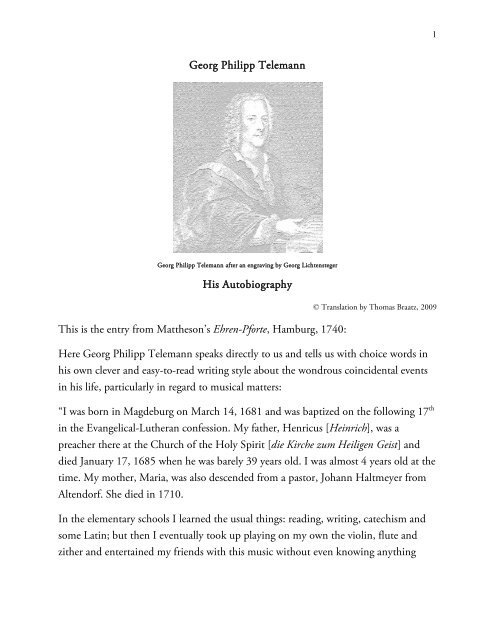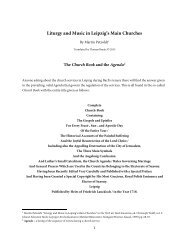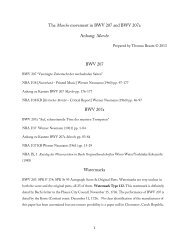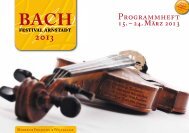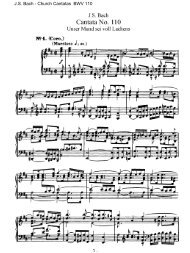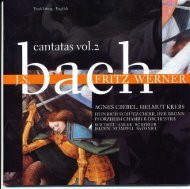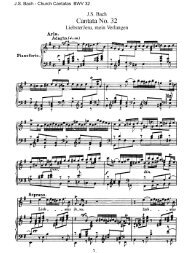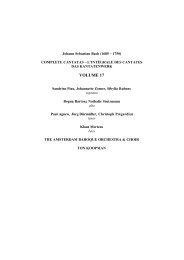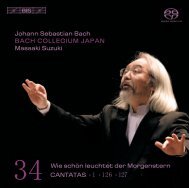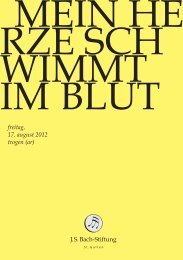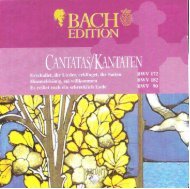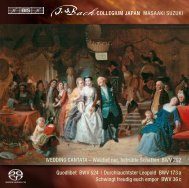Georg Philipp Telemann His Autobiography This is ... - Bach Cantatas
Georg Philipp Telemann His Autobiography This is ... - Bach Cantatas
Georg Philipp Telemann His Autobiography This is ... - Bach Cantatas
You also want an ePaper? Increase the reach of your titles
YUMPU automatically turns print PDFs into web optimized ePapers that Google loves.
<strong>Georg</strong> <strong>Philipp</strong> <strong>Telemann</strong><br />
<strong>Georg</strong> <strong>Philipp</strong> <strong>Telemann</strong> after an engraving by <strong>Georg</strong> Lichtensteger<br />
<strong>H<strong>is</strong></strong> <strong>Autobiography</strong><br />
<strong>Th<strong>is</strong></strong> <strong>is</strong> the entry from Mattheson’s Ehren-Pforte, Hamburg, 1740:<br />
© Translation by Thomas Braatz, 2009<br />
Here <strong>Georg</strong> <strong>Philipp</strong> <strong>Telemann</strong> speaks directly to us and tells us with choice words in<br />
h<strong>is</strong> own clever and easy-to-read writing style about the wondrous coincidental events<br />
in h<strong>is</strong> life, particularly in regard to musical matters:<br />
“I was born in Magdeburg on March 14, 1681 and was baptized on the following 17 th<br />
in the Evangelical-Lutheran confession. My father, Henricus [Heinrich], was a<br />
preacher there at the Church of the Holy Spirit [die Kirche zum Heiligen Ge<strong>is</strong>t] and<br />
died January 17, 1685 when he was barely 39 years old. I was almost 4 years old at the<br />
time. My mother, Maria, was also descended from a pastor, Johann Haltmeyer from<br />
Altendorf. She died in 1710.<br />
In the elementary schools I learned the usual things: reading, writing, catech<strong>is</strong>m and<br />
some Latin; but then I eventually took up playing on my own the violin, flute and<br />
zither and entertained my friends with th<strong>is</strong> music without even knowing anything<br />
1
about notes on a page. When I was ten, I began attending the Gymnasium 1 where I<br />
received a higher level of instruction from the cantor, Mr. Benedicto Chr<strong>is</strong>tiani, all the<br />
way to the highest level classes taught by the rector, Anton Werner Cuno, and finally<br />
also by Mr. N. Müller, the rector at the Cathedral [Dom] Gymnasium. The latter was<br />
responsible for instilling in me my love for German poetry and literature. All my<br />
teachers were very much sat<strong>is</strong>fied with my efforts2, or more specifically my ability to<br />
comprehend quickly. They gave me good grades for my foundation in Latin, but<br />
particularly for my abilities in Greek. And yet, one can really forget a lot without<br />
practice!<br />
In music I had learned so much in only a few weeks that the cantor let me be h<strong>is</strong><br />
substitute for singing classes even though many in the class were much better than I.<br />
During these classes he would be composing, but whenever he turned h<strong>is</strong> back on us, I<br />
would look at h<strong>is</strong> scores and would always find something in them to delight me. But<br />
I have no idea why I would get excited about th<strong>is</strong>. In short, I was prompted to snatch<br />
up all different kinds of music and write out my own copies of the scores which I<br />
would study assiduously and thereby gain greater understanding until, finally, I report<br />
th<strong>is</strong> in all honesty, I began composing myself, but without anyone knowing about<br />
th<strong>is</strong>.<br />
Meanwhile, using an assumed name, I found a way to get my m<strong>is</strong>erable effort at<br />
composition into the cantor’s hands and those of h<strong>is</strong> prefect. Then I began to hear in<br />
church and on the street the best possible pra<strong>is</strong>e for the composer of th<strong>is</strong> score. <strong>Th<strong>is</strong></strong><br />
emboldened me so much that I, at the age of twelve, got a hold of an opera from<br />
Hamburg, Sig<strong>is</strong>mundus, and set it to music. It was performed on a hastily erected stage<br />
with me singing the role of the hero rather defiantly. I would love to see th<strong>is</strong> score<br />
again if I were not in my right mind!<br />
Before I could attain such abilities in music, I first had to get some keyboard<br />
instruction, but unfortunately my first and only teacher was an organ<strong>is</strong>t who tried to<br />
1 a college/university preparatory school<br />
2 Fleiß = hard work<br />
2
terrorize me with German keyboard tablature notation which I then proceeded to play<br />
as stiffly as h<strong>is</strong> grandfather did, from whom he originally inherited it. In my head I<br />
heard all sorts of more interesting melodies than were presented to me here. So I<br />
decided, after two weeks of torture, to quit these lessons. After th<strong>is</strong> point in time, I<br />
never did learn anything more from music teachers.<br />
Oh, but what storms I had to endure because of the opera mentioned above! Hordes<br />
of music haters came to my mother and tried to persuade her that I would become<br />
charlatan, tightrope walker, minstrel, woodchuck trainer3, etc., if I did not stop my<br />
involvement with music. The next thing I knew, they had taken away all my scores<br />
and instruments. With th<strong>is</strong> they had robbed me of half of my life. In order to cure me<br />
of my preoccupation with music even more, they had decided to send me away from<br />
Magdeburg to a school in Zellerfeld located in the Harz Mountain region. <strong>Th<strong>is</strong></strong><br />
probably happened because my music tyrants probably thought that the witches in the<br />
Harz Mountains could not stand any music at all.<br />
So, at the age of 13 with a letter of recommendation in hand, a letter addressed to the<br />
Superintendent Mr. Caspar Calvör, who was to watch over my studies carefully, a<br />
directive which was faithfully carried out, my knowledge of academic subjects was<br />
increased, particularly in regard to surveying. But even th<strong>is</strong> fate was to take on the<br />
aspects of a Greek play.<br />
After some time had passed, a mountain festival was to take place and the cantor was<br />
asked to set to music some poetry that been prepared for him. Unfortunately, he<br />
suffered from rather severe gout. Meanwhile I had already confided to one of my<br />
fellow students that I knew how to set texts to music. He revealed th<strong>is</strong> to the cantor<br />
whereupon I was summoned to him and, upon h<strong>is</strong> request, accepted to complete th<strong>is</strong><br />
task. When the day of the performance arrived, my cantor still could not leave h<strong>is</strong><br />
sickbed. That <strong>is</strong> why I ended up conducting the music as well. Since I was still not<br />
very tall, I had to stand on a small bench so that I could be seen by all the musicians.<br />
There were quite a few vocal<strong>is</strong>ts and instrumental<strong>is</strong>ts and the music sounded good.<br />
3 Murmelthierführer<br />
3
The guileless miners, who were moved more by my small stature than by the<br />
harmonious music, wanted to show me their appreciation after the church service was<br />
over. A crowd of miners accompanied me home with one of them carrying me on h<strong>is</strong><br />
shoulder. All the while to honor me, I heard them frequently exclaim: “You are a<br />
proper little leader who sets the tone for all the others!”<br />
My Latin-teaching custodian, good Mr. Calvör, summoned me to h<strong>is</strong> office and<br />
revealed to me the pleasure he had l<strong>is</strong>tening to my music and urged me continue my<br />
efforts in composing and conducting. He also demonstrated to me the relationship<br />
between Meßkunst4 and music – the books and articles that he later wrote prove that<br />
he was a master in both. <strong>Th<strong>is</strong></strong> was enough so that my mother abandoned the prom<strong>is</strong>e<br />
that she had made to others. <strong>Th<strong>is</strong></strong> then tempted me to once again to indulge myself in<br />
a sort of innocent d<strong>is</strong>obedience by beginning to play my spinet again, trying to figure<br />
out basso continuo on my own, and writing down my own set of rules for th<strong>is</strong>. I did<br />
th<strong>is</strong> because I did not know that books had already been written on th<strong>is</strong> subject. I also<br />
did not want to ask the organ<strong>is</strong>t because of the fear that had been instilled in me by<br />
the terrible experience in Magdeburg that I still remembered quite clearly. I did not<br />
now forget to practice violin and flute as well. For almost every Sunday I prepared a<br />
cantata. For the choir I composed motets and for the city musicians all kinds of special<br />
event symphonies.<br />
After having spent four years in Zellerfeld in the Harz Mountains, I received a request<br />
5<br />
from the then famous principal of the gymnasium in Hildesheim, Mr. Mag<strong>is</strong>ter<br />
Loßius, to attend h<strong>is</strong> school. From Magdeburg I received perm<strong>is</strong>sion to do th<strong>is</strong> (I<br />
suspect that my patron [Loßius] very likely had written to my mother and her<br />
adv<strong>is</strong>ors). It was customary for Mr. Loßius to write the libretti every year for one or<br />
two plays and have them performed in such a way that the recitatives were spoken but<br />
the arias were sung. For the latter I had to compose the music which the l<strong>is</strong>teners<br />
probably liked because I was still small and skinny.<br />
4 ‘art of measurement’, ‘art of being measured or well-balanced in all things’, or geometry<br />
5 an academic title<br />
4
I did not m<strong>is</strong>s any classes unless it happened to be logic class with its “Barbara,<br />
Celarent” 6 which I simply could not stand. To get to the point, I kept making my way<br />
to the top of the upper form [senior class] of 150 students until I was the third highest<br />
ranking student in that class.<br />
I chose as models for study compositions by Steffani, Rosenmüller, Corelli and<br />
Caldara, in order to apply what I had learned to my future church and instrumental<br />
compositions. I never let a single day go by without putting down on paper at least<br />
7<br />
one staff filled with notes. With the two neighboring musical organizations from<br />
Hannover and Braunschweig, where I was frequently a v<strong>is</strong>itor for special festivals and<br />
fairs and otherw<strong>is</strong>e as well, I was given the opportunity to learn how to d<strong>is</strong>tingu<strong>is</strong>h<br />
between the French style on the one hand and the theatrical style on the other. But<br />
most importantly I obtained a closer acquaintance with the Italian style. Also, the<br />
excellent instrumental<strong>is</strong>ts in these cities stimulated in me the desire to improve my<br />
own ability to play these instruments. <strong>Th<strong>is</strong></strong> would have happened if I had not been<br />
6<br />
The words, Barbara, Celarent are at the beginning of a mnemonic, nonsensical poem used to teach the<br />
figures and moods of the Ar<strong>is</strong>totelian syllog<strong>is</strong>m. One version of such a Medieval Latin poem goes as follows:<br />
Barbara celarent darii ferio baralipton.<br />
Celantes dabit<strong>is</strong> fapesmo fr<strong>is</strong>esomorum.<br />
Cesare camestres festino baroco darapti.<br />
Felapton d<strong>is</strong>am<strong>is</strong> dat<strong>is</strong>i bocardo fer<strong>is</strong>on.<br />
Another version reads:<br />
Barbara Celarent Darii Ferioque prior<strong>is</strong>;<br />
Cesare Camestres Festino Baroco secundi;<br />
Tertia Darapti D<strong>is</strong>am<strong>is</strong> Dat<strong>is</strong>i Felapton Bocardo Fer<strong>is</strong>on habet;<br />
quarta insuper addit Bramantip Camenes Dimar<strong>is</strong> Fesapo Fres<strong>is</strong>on.<br />
The first three vowels in each word give the clues for use in identifying each of the 19 Ar<strong>is</strong>totelian syllog<strong>is</strong>ms<br />
known to scholars in the the Middle Ages. The vowels (A, E, I, O) show the quantity and quality of the<br />
prem<strong>is</strong>es.<br />
7 Capelle = cons<strong>is</strong>ting of both choir and orchestra<br />
5
driven by a strong fire of enthusiasm to acquaint myself with other instruments<br />
besides keyboard, violin and flute. Now I also turned to learning how to play the<br />
oboe, transverse flute, chalameau/chalumeau8 , viola da gamba and even the contrabass<br />
and the bass trombone.<br />
The director of music, Father Cr<strong>is</strong>pus, a Jesuit serving in the Roman Catholic<br />
Church, whom I diligently served by singing and playing instruments for h<strong>is</strong><br />
performances, began to like me and after he had attempted in vain with h<strong>is</strong> passionate<br />
persuasive powers to urge me to return to the bosom of h<strong>is</strong> church, finally conceded<br />
and, in a generous mood, passed me off to the Godehardin Monastery, one of the<br />
most important in that region. There I was given the task to prepare all the musical<br />
materials for the evangelical church service and I introduced German cantatas to be<br />
performed at various points during it. The cantata texts often contained points of<br />
religious d<strong>is</strong>pute and I tried to avoid all those which might be offensive to our<br />
religion. For th<strong>is</strong> position of responsibility, I received the perm<strong>is</strong>sion of the otherw<strong>is</strong>e<br />
very fussy superintendent, Mr. D. Johann Riemers.<br />
9<br />
Finally I had had enough of these years of service in a subordinate position and<br />
wanted very much to attend a university, so I chose Leipzig University. I then<br />
returned to my native city to prepare what was necessary to achieve th<strong>is</strong> objective. I<br />
had to take a special examination from which it was determined that I should study<br />
law and give up music entirely. <strong>Th<strong>is</strong></strong> had been my intention anyway and I acquiesced<br />
without any objection having firmly intended to become a privy councilor. I left all<br />
my scores and instruments behind and traveled from Magdeburg to Leipzig in 1701.<br />
On my way there I stopped in Halle and became acquainted with <strong>Georg</strong> Friedrich<br />
Händel where I almost would have started composing again10. However, I remained<br />
steadfast and arrived in Leipzig with my previous intentions intact. Standing in front<br />
8 an early form of the clarinet<br />
9 Manteljahre = years of wearing the cloak/cape as required dress in a church during a performance<br />
10 Notengift einsaugen = to soak up/suck in the po<strong>is</strong>on of musical notation/music manuscripts<br />
6
of a bulletin board for university students there, I reached an agreement with a<br />
handsome, young man to become h<strong>is</strong> roommate. When my baggage was delivered to<br />
h<strong>is</strong> apartment, how my heart did jump for joy when I saw all sorts of musical<br />
instruments in the corners and walls of th<strong>is</strong> room! Every evening I heard music<br />
performed on these instruments. I marveled at all th<strong>is</strong> although I knew that I could<br />
play these instruments much better myself.<br />
All the while I had already begun attending lectures which were given by the following<br />
professors: Mr. Otto Menken, Sr., Mr. Andreas Mylius, Law, Mr. N. Weidling,<br />
Oratory, and Mag<strong>is</strong>ter N. Calv<strong>is</strong>ius, Philosophy.<br />
Meanwhile my roommate, I do not know how th<strong>is</strong> really happened, d<strong>is</strong>covered by<br />
chance between the linen sheets in my suitcase Psalm 6 which I had set to music. I<br />
explained to him why I had composed th<strong>is</strong> and he approved, but then he asked me if<br />
he could have it so that it could be performed next Sunday in St. Thomas Church.<br />
After hearing th<strong>is</strong> composition, Mr. D. Romanus, the mayor of Leipzig at that time<br />
and also a privy councilor liked it so much that he persuaded me to compose<br />
something like th<strong>is</strong> once every two weeks, for which I would receive considerable<br />
remuneration. He did not prom<strong>is</strong>e me that any future advantages would come of th<strong>is</strong><br />
other than that he adv<strong>is</strong>ed me not to abandon my studies.<br />
Now, when I received a new sum of money from my mother, whose orders I<br />
respected, I thought of her, sent back the money, wrote to her about my present<br />
circumstances and asked her to change her mind about my music-making. She gave<br />
me her blessing for my new endeavor. Now at least I was a musician again even if it<br />
was only part-time.<br />
Soon thereafter I took over the direction of operas, about 20 or so, some of which I<br />
had requested from Sorau and Frankfurt and for many of which I also composed the<br />
7
verses. For the We<strong>is</strong>senfels Court I completed about four operas and brought the still<br />
ex<strong>is</strong>ting Collegium musicum in Leipzig back to life again. 11<br />
The organ in the New Church was finally fin<strong>is</strong>hed and I was appointed to the position<br />
12<br />
of organ<strong>is</strong>t as well as the director of music in that church. I played that instrument<br />
only for the consecration of that instrument. After that I let other students play it and<br />
they argued among themselves as to who should get to play it next. Compositions by<br />
the excellent Johann Kuhnau served as my models in fugue and counterpoint;<br />
however, a constant occupation on my part for the improvement of my melodic<br />
movements was accompl<strong>is</strong>hed by their careful examination frequently either with my<br />
v<strong>is</strong>iting Händel in Halle or h<strong>is</strong> coming here to Leipzig to v<strong>is</strong>it me. We also<br />
corresponded with each other often.<br />
Traveling from Leipzig, I managed to v<strong>is</strong>it Berlin on two occasions. There I was able<br />
to attend a performance of Polyphemo by Giovanni Bononcini and another private<br />
performance (my friends brought me in secretly [they kept me hidden] because only<br />
few people were allowed to attend) which was performed mainly by high-ranking<br />
individuals, among them Margravine from Kassel who sang and who was<br />
accompanied on the keyboard; and an orchestra cons<strong>is</strong>ting, for the most part, of court<br />
13 14<br />
conductors and first-chair players . More specifically these were Padre Attilio<br />
11 Here <strong>Telemann</strong> contradicts directly what has generally been asserted by all experts who refer to th<strong>is</strong> part of<br />
<strong>Telemann</strong>’s biography. The common contention <strong>is</strong> that he founded or, as the MGG1 more carefully puts it:<br />
“<strong>Telemann</strong> newly founded the Leipzig Collegium musicum”. The fact <strong>is</strong> that such Collegia musica (note the<br />
plural form) in Leipzig were in ex<strong>is</strong>tence, sometimes intermittently or often simultaneously (as during J. S.<br />
<strong>Bach</strong>’s tenure there) from the middle of the 17 th century. The earliest documentation of these musical groups<br />
goes back to 1657 under the direction of Adam Krieger, to 1672 under Johann Chr<strong>is</strong>toph Pezel, to the 1680s<br />
under Johann Kuhnau, to 1702 under <strong>Telemann</strong> and to 1708 under Fasch. The Collegium musicum which<br />
<strong>Telemann</strong> revived or ‘newly founded’ has a direct line to J. S. <strong>Bach</strong> via Melchior Hoffmann, J. G. Vogler,<br />
<strong>Georg</strong> Balthasar Schott while Fasch’s Collegium musicum was taken over by Johann Gottlieb Görner in 1723.<br />
12 In th<strong>is</strong> instance Musikdirector – a more frequent designation used by <strong>Telemann</strong> <strong>is</strong> Capellme<strong>is</strong>ter.<br />
13 In th<strong>is</strong> context Capellme<strong>is</strong>ter <strong>is</strong> a plural form.<br />
14 Concertme<strong>is</strong>ter = concertmasters<br />
8
Ariosti, the two brothers, Antonio and Giovanni Bononcini, the chief court<br />
conductor15 Rieck, Ruggiero Fedeli, Volümier 16,<br />
Conti, La Riche, Forstmeier, etc.<br />
In 1704 I accepted an appointment as court conductor/music director in Sorau, where<br />
<strong>H<strong>is</strong></strong> Excellency Count Erdmann von Promnitz resided. The splendid character of th<strong>is</strong><br />
court which had been furn<strong>is</strong>hed in a truly royal manner moved me to undertake<br />
enterpr<strong>is</strong>ing projects enthusiastically, particularly in regard to instrumental pieces of<br />
17<br />
which I chose exqu<strong>is</strong>ite ouvertures with their accompanying movements, because the<br />
count had recently returned from France and had grown to love th<strong>is</strong> type of music. I<br />
obtained scores by Lully, Campra and other good composers and shifted my efforts to<br />
concentrate almost completely on the same style of composition which they<br />
represented so that, over a period of two years, I had composed about 200 ouvertures<br />
in th<strong>is</strong> style.<br />
When the court moved to Plesse, an Upper-Silesian area which the Promnitz family<br />
governed, I became acquainted there and also in Krakau with Pol<strong>is</strong>h and Moravian<br />
music in its true, barbaric beauty. In the common inns of the region, the instruments<br />
cons<strong>is</strong>ted of a violin which was strapped to the body, tuned a third higher than usual,<br />
and which could ‘outscream’ [play with a louder, shriller sound] a normal violin, a<br />
Pol<strong>is</strong>h bagpipe, a bass trombone and a portative. In fancier inns a portative would not<br />
be used, but the first two [Pol<strong>is</strong>h violins and bagpipes] were increased in number. I<br />
had once heard 36 bagpipes and 8 Pol<strong>is</strong>h violins playing together. It <strong>is</strong> impossible to<br />
imagine the fantastic musical ideas they presented between dances when the dancers<br />
rested and the musicians improv<strong>is</strong>ed music together [‘jammed’] to fill out the time.<br />
Anyone who paid very close attention could pick up in 8 days sufficient musical ideas<br />
to last a lifetime. In short, in th<strong>is</strong> music there <strong>is</strong> much that <strong>is</strong> good if you know how to<br />
15 Obercapellme<strong>is</strong>ter<br />
16 <strong>Th<strong>is</strong></strong> name has been corrupted in German to Woulmyer = Wohlmeyer/Wohlmeier.<br />
17 The term Ouverture in early 18 th century Germany refers in most instances to a substantial initial movement<br />
(usually a French overture) followed by a number of individual movements which compr<strong>is</strong>e a suite.<br />
9
work with th<strong>is</strong> material properly. Later I had composed various concerti and trios in<br />
th<strong>is</strong> manner in which I featured a solo Italian bagpipe with alternating adagio and<br />
allegro sections.<br />
There <strong>is</strong> something remarkable that I do not want to neglect to mention here. Twice<br />
the large number of persons serving in th<strong>is</strong> court, even those that might have<br />
considered themselves to be especially favored, were fired. I, however, remained.<br />
Otherw<strong>is</strong>e music generally took precedence18. Finally, in Sorau, I was able to make a connection with the famous cantor, Wolfgang<br />
Caspar Printz. He presented himself as a kind of Heraclitus and I as a Democritus, for<br />
he mourned bitterly over the excesses of composers with emphas<strong>is</strong> on melody at the<br />
same time just I ridiculed the artificial, unmelodic affectations of the older masters.<br />
Since he still maintained the hope that I would depart from the confusion and<br />
19 nonsense of the former [emphas<strong>is</strong> upon the melodic element over the contrapuntal],<br />
he wanted to inform me, just before my departure to E<strong>is</strong>enach in 1708, about a rare<br />
secret which I should tell the Duke of Gotha, after receiving from him a certain sum<br />
which we would share between us. The secret was th<strong>is</strong>: using music not only to direct<br />
all the activities of a foreign min<strong>is</strong>ter, a general on the battlefield, etc., but to <strong>is</strong>sue<br />
orders as well. But since I could l<strong>is</strong>ten only halfheartedly to th<strong>is</strong> presentation, I was<br />
robbed of th<strong>is</strong> experience of dabbling in black magic.<br />
Up until th<strong>is</strong> point in my life I felt that I was like those chefs who have a number of<br />
pots on the fire, but from which they allow tasters to try only the results from a few of<br />
them. But now I intended to prepare a complete meal, that <strong>is</strong>, to show the world,<br />
using my pen, everything that I had learned in regard to instrumental and vocal<br />
music. At first th<strong>is</strong> plan was directed primarily toward instrumental music, the various<br />
aspects of which I sought to learn and clarify together with Mr. Pantaleon<br />
18 a more literal rendering here would be: “music had the prerogative of ‘being part of the first dance’”<br />
19 Babel<br />
10
Hebenstreit, who played the violin as my subordinate 20 (I was the concertmaster) in<br />
the orchestra at both banquet festivities and performances venues at court and whom I<br />
cannot sufficiently pra<strong>is</strong>e. Although Mr. Hebenstreit had the title of a director, he<br />
nevertheless played along in the court orchestra where he also performed on h<strong>is</strong><br />
wonderful instrument21 . Soon a musical group 22 was gradually formed, after the Duke<br />
had expressed h<strong>is</strong> appreciation of several church cantatas that I had presented and for<br />
which I sang the solo part. As a result, I received the command to hire the necessary<br />
singers, who would then also play the violin for instrumental compositions. After<br />
these had arrived at court, I was appointed director of music while still continuing<br />
with my duties as orchestra conductor/concertmaster23. I must express a word of pra<strong>is</strong>e<br />
about th<strong>is</strong> Capelle which was setup mainly to emulate the French style. <strong>Th<strong>is</strong></strong> it did so<br />
well that I believe it surpassed the famous Par<strong>is</strong>ian Opera Orchestra which I had just<br />
recently heard.<br />
I am reminded here of the strong support given to me by Mr. Hebenstreit on the<br />
violin. He must certainly be considered one of the best violin players known to me. I<br />
24<br />
remember well whenever we had to play a concert together, I would lock myself in<br />
my room with the sleeve of my left arm rolled up and with th<strong>is</strong> arm greased with<br />
ointment to strengthen the nerves and would try to improve my technical skill in<br />
order to try to hold my own against h<strong>is</strong> superior playing ability. And lo and behold,<br />
my playing would improve considerably. Without considering the beautiful<br />
compositions which he had composed, it would be easy to imagine the large number<br />
of compositions which I supplied. I completed four yearly cantata cycles besides two<br />
20 Concertme<strong>is</strong>ter = conducting while playing the violin(?)<br />
21 Hebenstreit <strong>is</strong> said to be the inventor of the Cymbal or Cimbal, often called a Pantaleon after h<strong>is</strong> first name.<br />
It <strong>is</strong> a kind of dulcimer or extended version of a zither with 185 double strings of metal and gut.<br />
22<br />
Capelle = choir and orchestra that perform in church, but which could also serve in performing secular<br />
cantatas or operas elsewhere<br />
23 Concertme<strong>is</strong>ter = the one who leads the orchestra from the first violin position<br />
24 Concert = th<strong>is</strong> could refer either to a concerto or a to a concert<br />
11
others which were for the afternoon services where a few cantatas were still m<strong>is</strong>sing,<br />
not to mention the masses, communion music and the psalms. Add to these the<br />
serenatas25 for birthdays and name-days for which I also prepared the libretti. There<br />
must have been about 20 of these besides another 50 cantatas in Italian and German.<br />
How <strong>is</strong> it even possible to remember all my other compositions for strings and brass<br />
instruments?! I placed special emphas<strong>is</strong> on trios where my method involved making<br />
the second part just as important as the first and where the bass moved along with a<br />
natural melody and harmony closely associated with the two treble parts so that every<br />
note could not be any other note than the one it was. People tried to compliment me<br />
by saying that th<strong>is</strong> was my special forte.<br />
From Sorau I traveled to Berlin in 1705 and once again in 1708 to attend the funeral<br />
services of the Queen of Prussia and her husband the King respectively. Here I heard<br />
the funeral music composed by Mr. Ruggiero Fedeli as well as two operas, Sieg der<br />
Schönheit and Roxane. The first opera was composed by Mr. Gottfried Finger and Mr.<br />
Augustin Reinhard Stricker with dances supplied by Mr. Volümier. Mr. Finger was<br />
entirely responsible for composing the second opera. Mr. Finger was, at that time,<br />
court musician for the Count of Palatine in Breslau, but later a chamber counsel for<br />
the Electoral Palatinate whereas Stricker was a royal chamber musician and finally<br />
became the director or music/conductor at the Court of the Electoral Palatinate.<br />
In 1709 I married for the first time. My wife, Amalia Lou<strong>is</strong>e Julian [Eberlin], was the<br />
second daughter of Daniel Eberlin, who had been a ship captain who fought in Morea<br />
under the pope’s flag against the Turks, later became a librarian in Nürnberg, then a<br />
director of music in Kassel and after that served as a teacher of the pages, director of<br />
music, privy councilor, superv<strong>is</strong>or and designated regent in Westerwald at the service<br />
of the court in E<strong>is</strong>enach, then later yet as a banker in Hamburg and Altenau, and<br />
finally as a captain in the country-wide militia in Kassel. He certainly had experienced<br />
very adventurous, positive changes of fortune and had a gifted mind, the likes of<br />
25<br />
A serenata <strong>is</strong> series of compositions usually for both voices and instruments but sometimes only for<br />
instruments.<br />
12
which are rarely found. In regard to music, he was, as a composer, a learned scholar of<br />
counterpoint and could play the violin very well. Proof of th<strong>is</strong> can be found in h<strong>is</strong><br />
trios which were publ<strong>is</strong>hed in Nürnberg [in 1675]. He has also figured out that there<br />
are 2000 different ways to tune a violin26. Shortly before my marriage in 1709, I was offered a generous position at court as a<br />
court secretary who would also have a seat at the marshal’s table, a position I would<br />
also have had in Sorau. The reason for th<strong>is</strong> could have been that no position of music<br />
27<br />
director had yet been establ<strong>is</strong>hed since there had not really been true Capelle there<br />
before, but soon I was the oldest member in my rank because others had passed away<br />
or had taken positions elsewhere. In time I was placed in the group among all the<br />
other councilors.<br />
I have no idea what it was that caused me to leave such a choice position as the court<br />
in E<strong>is</strong>enach; but I do remember having once heard back then: “Whoever would want<br />
a position where he could stay for the rest of h<strong>is</strong> life, he should settle in a republic.”<br />
That <strong>is</strong> why I then obtained a position as music director at the Barfüsser Church in<br />
Frankfurt/Main and settled there without knowing a single person. However, th<strong>is</strong><br />
pleasant sense of freedom in one’s life replaced fully the loss and suffering I had<br />
28<br />
endured from one specific gentleman and from well-meaning virtuosi. Although my<br />
yearly salary was rather substantial, I nevertheless establ<strong>is</strong>hed contacts with nobility<br />
and entered into the service of the Frauenstein society where I assumed the<br />
superv<strong>is</strong>ory responsibility over their palace, one which was occupied by those involved<br />
in the selection and crowning of the Holy Roman Emperor, and where I also had my<br />
apartment. Because the members of th<strong>is</strong> Frauenstein society were also admin<strong>is</strong>trators<br />
of a handsome Bavarian inheritance/trust fund dedicated to providing for the poor,<br />
they designated me to be the one who d<strong>is</strong>tributes the continuing interest/earnings of<br />
26 th<strong>is</strong> refers to the variants of scordatura<br />
27 again Capelle here <strong>is</strong> a combination of vocal and instrumental musicians<br />
28 brav = good<br />
13
th<strong>is</strong> fund as they accrue. Soon after th<strong>is</strong> I was appointed director of music at the<br />
second main Lutheran church, St. Catherine. In addition, I accepted the position of<br />
‘actual’ director of music29 in E<strong>is</strong>enach and had to keep sending scores and parts<br />
required for church [sacred] and court [chamber] performances.<br />
30<br />
When, on my various trips I traveled by chance through Gotha in 1716, I found out<br />
that the very skilled director of music, Chr<strong>is</strong>tian Friedrich Witt, had died and that the<br />
position could be offered to me. I was reminded how well situated I was in<br />
Frankfurt/Main with a yearly income of 1600 florins31 and so I left Gotha, but then I<br />
returned. Good friends detained me until the next postal coach would pass through<br />
town. The very loving manner in which th<strong>is</strong> matter was treated, but particularly the<br />
advantageous trait exhibited by an incomparable prince (whose musical abilities were<br />
not much less than mine) caused me to forget the Main River [where Frankfurt <strong>is</strong><br />
situated] and accept a position here with a yearly salary of 500 Reichsthaler, 32<br />
2 bushels<br />
29 Capellme<strong>is</strong>ter von Haus aus = to provide music as a director of music without actually being present<br />
30 On one of these trips, <strong>Telemann</strong> was present at the bapt<strong>is</strong>m of h<strong>is</strong> godchild, Carl <strong>Philipp</strong> Emanuel <strong>Bach</strong>, in<br />
Weimar on March 10, 1714. The connection with Johann Sebastian <strong>Bach</strong> <strong>is</strong> described by Chr<strong>is</strong>toph Wolff in<br />
h<strong>is</strong> Johann Sebastian <strong>Bach</strong>: The Learned Musician, Norton 2000, p. 134 as follows:<br />
Additional evidence of <strong>Bach</strong>’s involvement in instrumental chamber music may be found in the performing parts<br />
for the Concerto in G major for 2 violins and orchestra by <strong>Georg</strong> <strong>Philipp</strong> <strong>Telemann</strong>, jointly copied by <strong>Bach</strong> and<br />
the violin<strong>is</strong>t Johann <strong>Georg</strong> P<strong>is</strong>endel, a student of Vivaldi’s and later concertmaster at the Dresden court. P<strong>is</strong>endel<br />
traveled through Weimar in 1709, when from all appearances he and <strong>Bach</strong> performed th<strong>is</strong> concerto with the court<br />
Capelle. <strong>Telemann</strong>, then Capellme<strong>is</strong>ter at the neighboring court of Saxe-E<strong>is</strong>enach, may well have participated in<br />
such a performance, or <strong>Bach</strong> and P<strong>is</strong>endel could have played the work with the E<strong>is</strong>enach Capelle as well. At any<br />
rate, <strong>Bach</strong> had an opportunity to establ<strong>is</strong>h closer professional and personal contacts with <strong>Telemann</strong> during the<br />
latter’s E<strong>is</strong>enach years, and he invited <strong>Telemann</strong> in 1714 to become godfather to h<strong>is</strong> second son, Carl <strong>Philipp</strong><br />
Emanuel. Carl received h<strong>is</strong> middle name from <strong>Telemann</strong>, who pursued h<strong>is</strong> godchild’s musical career with great<br />
interest and, toward the end of h<strong>is</strong> long life, helped arrange for h<strong>is</strong> godson to succeed him as music director in<br />
Hamburg in 1768.<br />
31 A Florin, in <strong>Telemann</strong>’s lifetime, was the equivalent of 21 Groschen. The Florin was a silver coin and was<br />
also called a Gulden. The Florin/Gulden had a value of € 63,00. Thus 1600 Florins as a yearly salary would<br />
equal in buying power (year 2000) € 100 800,00.<br />
32 A Reichsthaler/Reichstaler was the equivalent of 24 Groschen. The Reichsthaler was a silver coin and was often<br />
simply called a Thaler/Taler (the ‘h’ was removed in the late 19 th century with the German spelling reform;<br />
14
of wheat, 12 bushels of grain, 12 bushels of barley33 and 12 cords of wood, the usual<br />
access to provide music for numerous birthdays and festivals, and likew<strong>is</strong>e the ability<br />
to call upon the choir boys when needed with the potential that all these things could<br />
be increased in number in the future with the prov<strong>is</strong>o that the ruler would reward<br />
generously all my special musical services to him personally.<br />
In addition to these advantages, the court at [Saxe-]E<strong>is</strong>enach also offered me an<br />
34<br />
additional 200 Reichsthaler to appear in person as required at certain times still to be<br />
determined. Also, at the same time, Duke Ernst August of Weimar had decided on a<br />
similar offer to be extended to me, but with the notable extension/directive to use me<br />
to supply through the mail certain types of music to all the other Saxon royalty that<br />
belong to the Ernestine lineage for which I would receive the title of Director of<br />
Music for the Ernestine Family/Lineage. Meanwhile my whining wife, along with the<br />
persuasive powers of my relatives and friends, tried by means of pseudo arguments to<br />
take my mind off these deliberations. Most people began to believe that I had now<br />
received my just rewards for th<strong>is</strong> extremely fool<strong>is</strong>h idea that I had been entertaining<br />
that anyone would have likew<strong>is</strong>e felt obligated to carry out: I returned again to<br />
Frankfurt.<br />
My musical requirements there included having me fulfill the stipulations of my<br />
contract with E<strong>is</strong>enach which included some yearly cycles that were still incomplete.<br />
Then I completed five [cantata] cycles and increased my series of instrumental<br />
compositions which could help me fill out (in addition to those already mentioned)<br />
the grand weekly concerts at the Frauenstein Palace that I had begun there. These<br />
concerts also gave me a reason to compose the music for the 5 Oratorios [David<strong>is</strong>che<br />
etymologically it <strong>is</strong> related to the Engl<strong>is</strong>h word dollar). The Thaler/Taler had a value of € 72,00; thus 500<br />
Reichsthaler would equal in buying power a current yearly salary of € 36 000,00.<br />
33 A bushel of grain would normally cost € 65,00. The total grain (wheat, barley, etc.) would probably<br />
amount to approximately € 1 700,00 to € 2 000,00.<br />
34 200 Reichsthaler = € 14 400,00.<br />
15
Gesänge] based on the poetry of the royal Pol<strong>is</strong>h Ceremony Adv<strong>is</strong>or, Johann Ulrich<br />
König.<br />
I was drawn from Frankfurt to Dresden to attend the marriage of the present King of<br />
Poland. There I heard two operas by Mr. Lotti, one by Mr. Schmid and a fourth, in<br />
addition to two serenatas, by Mr. Heinichen. The main female and male singers were<br />
Ms. Lotti, Ms. Durastanti, who <strong>is</strong> called the ‘Countess’, Ms. Thesi, Ms. Heß, who<br />
although she <strong>is</strong> German <strong>is</strong> considered just as good as the others, Mr. Senesino, Mr.<br />
Bercelli, who can sing clearly all the way up to a high F, Franc<strong>is</strong>co Guicciardi, etc. In<br />
addition to the renowned, extraordinary virtuosi in Dresden, I also heard the famous<br />
Francesco Maria Veracini perform.<br />
For the joyous festival which took place in Frankfurt on the occasion of the birth of<br />
the Austrian Archduke and Prince of Asturia, I presented a comprehensive serenata35 outdoors on a specially constructed platform in the Römerberg section of the city.<br />
Among the performers were many excellent virtuosi who had been hired for th<strong>is</strong><br />
occasion. The entire musical group (singers and instrumental<strong>is</strong>ts) cons<strong>is</strong>ted of more<br />
than 50 persons. Afterwards I dedicated the score to <strong>H<strong>is</strong></strong> Royal Majesty. Then I began<br />
work on a masterpiece, the Passion-Oratorio by Mr. B. H. Brockes, a council member<br />
in Hamburg, and also after that had been completed, h<strong>is</strong> Vergnügen des Gehörs im<br />
Frühling, and finally upon h<strong>is</strong> request a Wassermusik after which Herbst and Winter<br />
followed. In regard to the Passion-Oratorio: it was performed with a full complement<br />
of singers and instrumental<strong>is</strong>ts in Hamburg on the special days of Holy Week. Many<br />
important people along with a large number of other l<strong>is</strong>teners were present for th<strong>is</strong><br />
performance, the profits of which were to go to the orphanage. In regard to th<strong>is</strong><br />
performance, something very special should be mentioned: At the church doors there<br />
were guards posted who were instructed not to allow entrance of any persons who did<br />
35 <strong>Th<strong>is</strong></strong> serenata was composed for the birth of Prince Leopold, son of the Holy Roman Emperor; its title was<br />
Teutschland grünt und blüht in Friede (the famous 3 trumpet concerto with 2 oboes, strings and timpani by<br />
<strong>Telemann</strong> serves as the opening movement) – the information for th<strong>is</strong> footnote has been supplied by Kim<br />
Patrick Clow.<br />
16
not bring with them a printed copy of the passion. Most of the members of the clergy<br />
were assembled and sat near the altar in their pontifical vestments. Subsequently th<strong>is</strong><br />
passion was then performed in the churches and auditoriums of many other cities in<br />
Germany.<br />
I must have composed about 20 wedding serenatas, for which I had also written the<br />
libretti. For many of the latter I had allowed myself so much free reign and excesses<br />
that I would seriously doubt that I could write anything like that now. My second<br />
marriage to Maria Catharina Textor, the eldest, unmarried daughter of the City Grain<br />
Recorder, Mr. Andreä Textor was consummated in Frankfurt/Main in 1714.<br />
The following compositions of mine were publ<strong>is</strong>hed in Frankfurt/Main: 6 Sonatas for<br />
Violin and Basso continuo; 6 Trios for Various Instruments and Bc; 6 Sonatinas for Violin<br />
and Bc; and a Small Chamber Music for Keyboard or Other Instruments.<br />
On July 10, 1721 I was selected to succeed Mr. Joachim Gerstenbüttel, who had<br />
passed away, as the next Director of Music of the City Orchestra and Choir36 and<br />
Cantor at the St. John Church in Hamburg. On the subsequent Michaelmas Day,<br />
after invitations had been previously sent out, I was ceremoniously<br />
initiated/inaugurated at a special event at which I had delivered a speech entitled<br />
Musica in Ecclesia [“Music in the Church”].<br />
About a year later I had taken over the direction of some operas which were losing<br />
their popularity and improved them (libretti and music). Several government officials<br />
and members of the nobility had noticed the difference and asked me to superv<strong>is</strong>e<br />
37<br />
with a yearly salary of 300 Reichsthaler the performance of new operas, including not<br />
only the composition of new music but the libretti as well.<br />
36<br />
The term used here <strong>is</strong> Director des musikal<strong>is</strong>chen Chors; in essence th<strong>is</strong> <strong>is</strong> a position as municipal<br />
Capellme<strong>is</strong>ter.<br />
37 300 Reichsthaler = € 21 600,00.<br />
17
In 1723 I received an offer from Leipzig to replace the ailing Director of Music and<br />
Cantor, Johann Kuhnau, who they presumed was approaching death. <strong>Th<strong>is</strong></strong> was a<br />
position that had already been prom<strong>is</strong>ed to me 20 years earlier. But it suited the City<br />
of Hamburg better to deny th<strong>is</strong> request from Leipzig by increasing substantially my<br />
living standard [by considerably improving my maintenance].<br />
The E<strong>is</strong>enach court, from which I was still receiving a salary of 100 Reichsthaler38 for<br />
my position as music director, now appointed me as an official correspondent at a<br />
salary of another 100 Reichsthaler. My duties for th<strong>is</strong> involved reporting to the court<br />
twice a week on any unusual news from my area in the northern part of Germany.<br />
In addition I received in 1726 from the Bayreuth court an appointment as music<br />
director. My responsibilities in th<strong>is</strong> instance compr<strong>is</strong>ed sending to the court from time<br />
to time some instrumental music and once a year an opera. For th<strong>is</strong> I would be reward<br />
annually with a remuneration of 100 Reichsthaler.<br />
In 1729 I received an offer from Russia to establ<strong>is</strong>h there a German orchestra and<br />
39 choir . <strong>Th<strong>is</strong></strong> later became an Italian musical group. The amenities offered by<br />
Hamburg and the fact that I had moved my household four times already outweighed<br />
the desire to obtain even more extraordinary honors.<br />
My long-planned trip to Par<strong>is</strong> where I had already been invited several years ago by<br />
some of the virtuosi who lived there and had taken great pleasure in [performing]<br />
some of my printed music finally took place around Michaelmas, 1737. <strong>Th<strong>is</strong></strong> trip took<br />
8 months. In Par<strong>is</strong> I had had engraved in copper for publication, after having received<br />
from the king the perm<strong>is</strong>sion and copyright for 20 years, new quartets (by previous<br />
subscription) and 6 sonatas cons<strong>is</strong>ting entirely of melodic canons. The aston<strong>is</strong>hing<br />
38 100 Reichsthaler = € 7 200,00.<br />
39 Here, once again, a single word, Capelle <strong>is</strong> used.<br />
18
manner in which the quartets were played by Messrs. Blauet, transverse flute,<br />
Guignon, violin<strong>is</strong>t, Forcroy, h<strong>is</strong> son on the viola da gamba, and Edouard, violoncell<strong>is</strong>t<br />
would deserve to be described here at length if only there were sufficient words<br />
available to do so. In short, they pricked up the ears of people at the court and in the<br />
city so that they became very attentive and, in a short time, I received general<br />
approbation which was accompanied by even greater politeness.<br />
In addition I also composed for amateurs two 2-part Psalms with instruments in<br />
Latin, a number of concertos, a French cantata, Polypheme, a humorous symphony on<br />
the popular song about Père Barnabas40, a score containing 6 trios to be printed after I<br />
had left, and finally the 71st Psalm as a grand motet with 5 vocal parts and various<br />
instruments. <strong>Th<strong>is</strong></strong> was performed twice in three days in a sacred concert by almost 100<br />
select musicians. Thus I left Par<strong>is</strong> with a feeling of having achieved great pleasure and<br />
in the hope that I would return again in the future.<br />
It <strong>is</strong> finally time to mention the children from my two marriages. From the first<br />
marriage I have only the one daughter Maria Wilhelmina Eleonora born on January<br />
14, 1711. From the other marriage there <strong>is</strong> a son, Andreas, born on May 25, 1715,<br />
now a candidate for a position in the Hamburg government; another son, Hans, born<br />
on July 14, 1716, had been a cadet in Dan<strong>is</strong>h army during the military campaign<br />
along the Rhein in 1735, presently in the service of privy councilor Alefeld; another<br />
son, Henrich Matthias, born on August 4, 1717, an apprentice to a drugg<strong>is</strong>t, Mr.<br />
Mühlrath in Lübeck; a daughter, Clara, born on January 20, 1719; a son, August<br />
Bernhard born on July 1, 1721, died on May 2, 1738; a son, Johann Bartold Joachim,<br />
born on March 13, 1723, will become a surgeon after he has fin<strong>is</strong>hed h<strong>is</strong> studies a<br />
little longer; a son, Benedict Conrad Eibert, born on September 12, 1724, an<br />
apothecary apprentice with my cousin, Mr. Warmholtz, in Stockholm; a son, Ernst<br />
Conrad Eibert, born on April 8, 1726, died on December 10, 1727. To summarize: I<br />
40 The full title of th<strong>is</strong> popular tune <strong>is</strong> "La béquille du Père Barnabas".<br />
19
have seven sons and two daughters. Of these, two sons are deceased so that I still have<br />
five sons and two daughters who are still living.<br />
Incidentally, I will add here another l<strong>is</strong>t, but th<strong>is</strong> one will be only very approximate.<br />
<strong>Th<strong>is</strong></strong> <strong>is</strong> a l<strong>is</strong>t containing works that I have completed over the past 18 years here. To<br />
th<strong>is</strong> l<strong>is</strong>t belong the following:<br />
12 cycles [of cantatas]; many long works with trumpets and timpani for high feast<br />
days, approximately 700 arias, which I had my students write on the blackboard<br />
during singing classes; 19 passions, of which two were very poetic and for one of<br />
which, Seeliges Erwägen [des bittern Leidens und Sterbens Jesu Chr<strong>is</strong>ti], I wrote the<br />
libretto myself; 6 for the mayors’ funerals; 12 for pastors’ initiations, 3 for jubilees as,<br />
for instance, for the Reformation, when almost every church had a different program,<br />
for the senior government officials and for the Admiralty; 3 for the consecration of<br />
new churches, 2 grand oratorios; 4 compositions for funerals held outside of<br />
Hamburg, 30 serenatas besides those for weddings and marriage ceremonies; 16<br />
serenatas and just as many oratorios for the civilian captains’ banquets; 35<br />
compositions for operas performed here such as ouvertures/preludes, intermezzi,<br />
postludes, and I translated the French libretto of Omphale into German and parts of<br />
Sieg der Schönheit along with adding and/or changing some movements, otherw<strong>is</strong>e<br />
none of the other operas [given in Hamburg] can be attributed to me; 2 operas, Stilico<br />
and Adelheid [oder Die ungezwungene Liebe] were sent to Bayreuth; 3 operettas to<br />
E<strong>is</strong>enach; and a entire series of vocal and instrumental compositions for the former<br />
winter concerts; approximately 600 ouvertures, trios, concerti, keyboard compositions,<br />
figural chorales, fugues, cantatas for amateurs here and in foreign countries.<br />
The following works have appeared in print: Harmon<strong>is</strong>cher Gottesdienst [oder Ge<strong>is</strong>tliche<br />
Cantaten zum allgemeinen Gebrauche], one yearly cycle for 1 voice, 1 instrument and<br />
bc; the continuation of th<strong>is</strong> for 1 voice, 2 instruments and bc; excerpts of arias from<br />
another yearly cycle (publ<strong>is</strong>hed by K<strong>is</strong>ner); music for the evangelical jubilees, 2<br />
cantatas, 6 secular cantatas, humorous arias from the opera Adelheid; Pimpinon, an<br />
intermezzo; 6 cantatas with a moral for 1 voice and bc; 6 similar cantatas for 1 voice, 1<br />
20
instrument and bc; 12 sacred canons for 2, 3, or 4 voices; a book of chorales/a<br />
hymnal; sonatas without a bass for 2 flutes or violins, methodical sonatas with<br />
embell<strong>is</strong>hments for violin or transverse flute and bc; the continuation of the same; the<br />
first 7 x 7 and a minuet; the second of the same; Heldenmusik [Musique héroique], an<br />
ouverture and a suite; 6 quartets for transverse flute, violin and viola da gamba or<br />
violoncello and bc; new sonatinas for keyboard; 3 methodical trios and 3 humorous<br />
sonatas for 2 violins or transverse flute and bc; 26 keyboard fantasias; 12 of the same<br />
for the transverse flute without bass; 13 for viola da gamba; Tafelmusik [Musique de<br />
table] for various instruments; 6 quartets or trios with 2 violins or transverse flute and<br />
2 violoncelli; 12 solos for transverse flute or violin and bc; 6 concerti and suites for<br />
keyboard instrument and transverse flute; Corelli-like sonatas [Sonates corell<strong>is</strong>antes] for<br />
2 violins or transverse flute and bc; melodic scherzi [Scherzi melodichi] for violin, viola<br />
and bc; 6 trios for 2 transverse flutes and bc (publ<strong>is</strong>hed in Par<strong>is</strong> from a manuscript I<br />
had happened to take along and where 7 of my works that appeared here in Hamburg<br />
were also reprinted); 24 chorales treated as fugues for organ and keyboard; an<br />
entertaining mixture or Scott<strong>is</strong>h pieces for keyboard and other instruments; 6<br />
ouvertures for 2 violins, viola, 2 horns and bc; Der Musicme<strong>is</strong>ter [Der getreue Music-<br />
Me<strong>is</strong>ter], containing all different kinds of musical styles for singing and playing; vocal,<br />
instrumental and bc exerc<strong>is</strong>es with arias, examples and rules for basso continuo<br />
playing; 6 new quartets with instruments (similar to the ones previously mentioned)<br />
publ<strong>is</strong>hed in Par<strong>is</strong>; 6 sonatas with 18 melodic canons for 2 transverse flutes or violin<br />
without bc, also publ<strong>is</strong>hed in Par<strong>is</strong>; fugues in the galant style and short pieces for<br />
keyboard; 6 symphonies with 2 violins, 1 horn and bc; a translation from the French<br />
of a description of the ‘eye’ organ. 41<br />
41 »Castel, Lou<strong>is</strong>-Bertrand (born in Montpellier, 5 Nov 1688; died in Par<strong>is</strong>, 19 Jan 1757) was a French<br />
mathematician, physic<strong>is</strong>t, journal<strong>is</strong>t and theor<strong>is</strong>t....Castel <strong>is</strong> recognized for three principal contributions to the<br />
development of scientific thought during the 18th century: a theory of gravity, a theory for popularizing<br />
science and mathematics and a theory of the correspondence of sound and color. Although the first two of<br />
these are retrospective and conservative for their time, the third [L’optique des couleurs (Par<strong>is</strong>, 1740)] <strong>is</strong> not,<br />
and it <strong>is</strong> the development of th<strong>is</strong> theory and its product, the ‘ocular harpsichord’, that found particular favor<br />
with h<strong>is</strong> contemporaries. Castel’s curiosity concerning the relationship of color to sound was initially<br />
stimulated by the thoughts expressed in the works of both Kircher and Newton. Building on the hypotheses<br />
of Descartes’ theory of light (as modified by Constantijn Huygens) Castel argued that light <strong>is</strong> a product of<br />
vibration, as <strong>is</strong> sound, and therefore that color and musical tone (being principal manifestations of light and<br />
sound respectively) are analogous in nature. Attempting to relate the spectrum of colors to the overtone series<br />
in music and extending th<strong>is</strong> relationship to ‘shade’ in both, he dev<strong>is</strong>ed a chromatic scale of 12 notes, each step<br />
of which <strong>is</strong> analogous to a specific color: C ‘bleu’, C# ‘céladon’, D ‘vert’, D# ‘olive’, E ‘jaune’, F ‘aurore’, F#<br />
21
I have also been the editor and publ<strong>is</strong>her of some works by good friends: 6 solos for<br />
violin and bc by Mr. Graf; 6 duets or trios for 2 violins with or without bc by Mr.<br />
Förster; instructions on transposing by Mr. Haltmeier.”<br />
<strong>Georg</strong> <strong>Philipp</strong> <strong>Telemann</strong><br />
Mattheson’s subscript/couplet following <strong>Telemann</strong>’s autobiography reads:<br />
People sing the pra<strong>is</strong>es of Lully; they speak very highly of Corelli;<br />
Only <strong>Telemann</strong> <strong>is</strong> above all pra<strong>is</strong>e.<br />
‘orangé’, G ‘rouge’, G# ‘cramo<strong>is</strong>i’, A ‘violet’, A# ‘agathe’, B ‘violant’. The construction of a harpsichord that<br />
coupled the sounding of pitches with the showing of analogous colors occupied Castel for almost 30 years.<br />
Different models were constructed (some using paper strips, others colored glass), but the interest in such an<br />
instrument, as well as in the general theory of relating color to sound, waned in France (if not in Germany)<br />
soon after Castel’s death.« The preceding <strong>is</strong> quoted from an article by Albert Cohen/<strong>Philipp</strong>e Vendrix in the<br />
Grove Music Online, Oxford University Press, 2009.<br />
22


